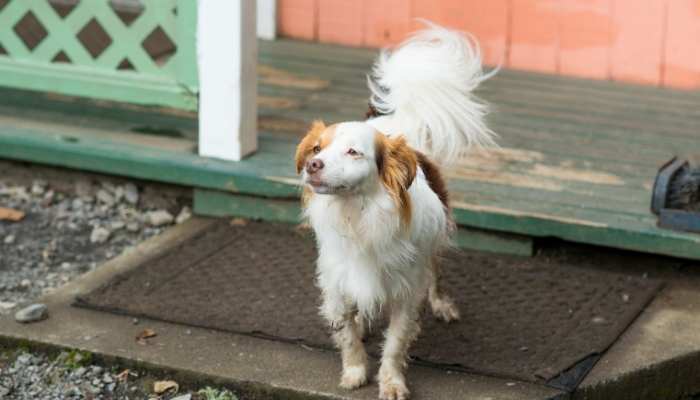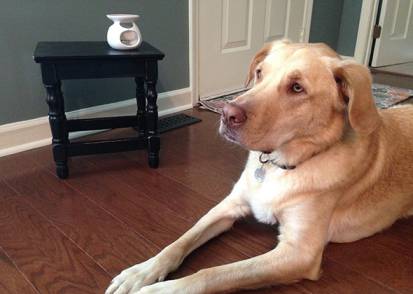Connect with a verified veterinarian in minutes. Licensed vets are available 24/7 to answer your questions. No need to worry about your furry family member.
Sometimes dogs don’t smell very good. That may because they’re rolled in something stinky, they need a bath, or perhaps they have a health problem that’s causing the bad smell.
Have you recently noticed that your dog smells like iron metal? If so, then you’ve come to the right place. It can be the smell is caused by a medical condition.
In this article, we’ll take a look at the reasons your dog may smell like iron metal. Let’s get started!
Reasons Your Dog Smells Like Iron Metal
Here are some of the most common reasons your dog may smell like iron metal!
Dog’s breath smells like metal: in this case, male and female dogs may have breath that smells like metal. This can be caused by bleeding, dental problems, kidney issues, or even an ulcer. The iron odor could even be from your dog licking his rear end due to anal gland issues. So, if you notice your dog’s breath smells like iron metal, and he’s not been chewing on anything different than his normal treats and toys, then it’s time to call the vet.
Dog’s vomit smells like iron metal: vomit that smells like metal can be a sign that your dog has a serious health condition. This is another sign it’s time to call the vet.
Dog’s urine smells like iron metal: both male and female dogs’ urine can smell like metal or iron if they have a kidney issue. The metallic smell could be caused by blood in their urine that’s being passed through the kidneys. This could be caused by an illness or an internal injury of the kidneys.
Dog’s skin smells like metal: this can be caused by the dog’s anal gland or blood on their skin, which produces a metal smell. If you notice this smell on your dog’s skin, then be sure to check him all over for any injuries, bites, and more. If you don’t find anything, then the cause could be impacted or infected anal glands.
Any of these symptoms means it’s time to take your dog for a checkup with the vet. They will give your dog a complete physical examination and probably do lab work, too. The vet will also ask questions about your dog’s symptoms and when you first began to notice the iron smell on your dog.
Even so, the main culprit of an iron smell on dogs is usually an anal gland problem.
Anal Glands & an Iron Metal Smell
A bad metallic odor may be coming from your dog’s rear end. If so, this may mean that his anal sacs (also called anal glands) are the cause. A dog’s anal glands work to secrete a scent that’s unique to your dog. The glands usually fill with fluid when your dog is ready to poop; as he poops, the anal glands secrete their fluid onto the poop as it passes through the rectal area.
When other dogs encounter your dog’s poop, they will learn many things about your dog. They’ll learn his sex, his overall health, and more. They will use the scent to recognize your dog next time.
Anal glands usually work just fine; however, they can develop some problems that cause that strong iron metal smell on your dog. Anal glands may become infected or blocked.

Review symptoms, medications & behavior to keep your pets healthy with a Vet Online in just minutes.
Ask a Vet Live NowSigns There’s a Problem with Your Dog’s Anal Glands
You may notice these symptoms if your dog’s anal glands become blocked:
- Scooting rear end on carpeting or in the grass outside
- You may notice fluid left behind in a place your dog was sitting (the glands may be leaking)
- The area near the glands may swell and become red
- Crying out or jumping suddenly due to pain
- Reluctance to poop due to painful bowel movements
- Swelling near the rectum
- Your dog has developed a strong, foul metallic odor
If you notice these symptoms in your dog, then it’s time to call the vet. Your dog needs to have his glands checked to see if they’re blocked or infected. This is a very painful condition that can become worse if left untreated.
What Causes Blocked Anal Glands?
Blocked anal glands, also called impacted anal glands, can be caused by several things:
Diarrhea: watery, soft stools may back up in the anal glands and cause a blockage.
Food allergies: can be caused by new dog food or a change in your dog’s environment. The allergy symptoms can cause a rash and inflammation all through a dog’s body. The inflammation can lead to the anal glands becoming blocked.
Obesity: can put pressure on the glands or even displace them, which causes the anal glands not to function correctly.
If you notice any symptoms that are not normal for your dog, as well as the iron metal smell, then be sure to call the vet. Your dog probably has an infection or impaction of his anal sacs. This can be a painful condition, that if left untreated, can result in ulcers that burst through the dog’s skin. If this should happen, the dog usually requires surgery to take care of the infection and repair the damage caused by the infection.
Treatment of Anal Gland Problems
At the vet’s, they will do a complete physical exam of your dog. This may include lab work and some images (such as an ultrasound or an x-ray). The vet will determine if the anal glands are impacted or if they have another problem, such as an infection.
The vet may also manually express the glands after removing the impaction. They will then show you how to do this same procedure safely at home. If you’re not able to manage expressing your dog’s anal sacs, then you can ask the vet to do it on a regular basis or even the groomer.
In dogs that have recurring impaction or infections in their anal glands, the vet may suggest surgery to remove the glands.
Preventing Anal Gland Problems
Preventing anal gland problems comes down to monitoring your dog’s health and early detection of any problems. You can check under your dog’s tail to see if there’s any redness or irritation, a foul iron metal smell, and more.
You may also learn how to manually express your dog’s anal glands. While this can be gross, it’s a way to keep your fur baby happy and healthy and to avoid painful infections and impaction.
Connect with a verified veterinarian in minutes. Licensed vets are available 24/7 to answer your questions. No need to worry about your furry family member.

Julie
Julie is a graduate of the University of North Carolina, Wilmington, where she studied Animal science. Though contrary to the opinion of her parents she was meant to study pharmacy, but she was in love with animals especially cats. Julie currently works in an animal research institute (NGO) in California and loves spending quality time with her little cat. She has the passion for making research about animals, how they survive, their way of life among others and publishes it. Julie is also happily married with two kids.
Review symptoms, medications & behavior to keep your pets healthy with a Vet Online in just minutes.
Ask a Vet Live Now




